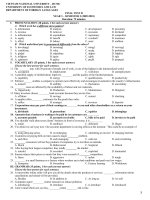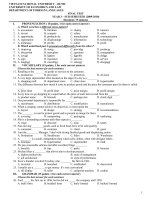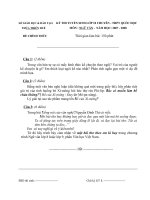Đề thi và đáp án môn Anh văn Trường Đại học kinh tế- luật - đề thi 3b
Bạn đang xem bản rút gọn của tài liệu. Xem và tải ngay bản đầy đủ của tài liệu tại đây (145.29 KB, 6 trang )
VIETNAM NATIONAL UNIVERSITY – HCMC
UNIVERSITY OF ECONOMICS AND LAW
DEPARTMENT OF FOREIGN LANGUAGES
FINAL TEST B
YEAR 3 – SEMESTER 2 (2009-2010)
Duration: 75 minutes
I. PRONUNCIATION (10 points, 1 for each correct answer)
A. Which word has a different stress pattern?
1. A. information B. analysis C. development D. proximity
2. A. revenue B. turnover C. recession D. dividend
3. A. infrastructure B. expenditure C. supremacy D. competitor
4. A. equity B. benefit C. overdraft D. insurance
5. A. effect B. labour C. asset D. emblem
B. Which underlined part is pronounced differently from the others?
6. A. developed B. increased C. raised D. serviced
7. A. conditions B. risks C. needs D. problems
8. A. global B. subsidiary C. debtor D. liability
9. A. inflation B. tactic C. cable D. sale
10. A. continent B. policy C. profit D. proposal
II. VOCABULARY (15 points, 1 for each correct answer)
Choose the best answer for each sentence.
11. The ________ rate, with 30 percent of people out of work, is one of the highest in the industrialized world.
A. occupation B. employment C. workforce D. unemployment
12. A plentiful supply of skilled labour improves ________ and the quality of the finished products.
A. capability B. energy C. qualifications D. productivity
13. Political ______ enables a company to operate more effectively and encourages investment in the country’s infrastructure.
A. turmoil B. stability C. fluctuation D. uncertainty
14. ________ costs are affected by the availability of labour and raw materials.
A. Opportunity B. Production C. Maintenance D. Marginal
15. Many investors choose ________ bank accounts because they are tax-free.
A. offshore B. savings C. current D. checking
16. A supplier often ________ customers for the goods they order.
A. settles B. arranges C. invoices D. deposits
17. Corporations may pay part of their earnings as________ to you and other shareholders as a return on your
investment.
A. dividends B. possessions C. equities D. belongings
18. Amounts that a business is waiting to be paid by its customers are ________.
A. accounts payable B. accounts receivable C. bills to be paid D. invoices to be paid
19. You shouldn’t talk about your clients’ business in front of everyone, it is _________.
A. unfair B. unethical C. dishonest D. illegal
20. ‘I’m afraid we can’t pay now. Our accounts department is moving offices at the moment.’ This could be an example of
________.
A. using delaying tactics B. overcharging C. submitting an invoice D. charging interests
21. Customers not paying bills on time caused a major ________ problem.
A. cash flow B. cash managing C. cash run D. cash circulating
22. ________ consumers will not buy products if companies try to test them on animals.
A. Moral B. Behavioural C. Sceptical D. Ethical
23. After buying their largest competitor, they totally ________ the market.
A. outsold B. exceeded C. exploited D. dominated
24. Sonara reduces their prices so much that they were accused of ________ competition.
A. fierce B. aggressive C. unfair D. tough
25. ________ is a small business or a factory where workers are in bad conditions and paid very low wages.
A. Enterprise B. Sweatshop C. Factory farming D. Workhouse
III. GRAMMAR (15 points, 1 for each correct answer)
Choose the best answer for each sentence.
26. A trustworthy online seller will give you all the details about the products or services. ________, information about
cancellations and refund will be provided.
A. Besides B. In addition to C. As long as D. As well
27. Companies agree ________ stricter measures to reduce pollution.
1
A. introducing B. introduce C. to introduce D. introduced
28. I don’t mind which one you buy, ________cotton ________ silk is fine.
A. neither / or B. either / or C. both / and D. all are correct
29. When large companies delay ________ their bills, they put their suppliers in an impossible position.
A. paying B. to pay C. pay D. paid
30. The company developed a range of cosmetics without ________ them on animals.
A. test B. tested C. testing D. to test
31. It was a great success to the company last year. Its operating profit increased by _________.
A. three quarters B. third quarter C. three quarter D. third quarters
32. All the information about delivery ________ on computer, allowing you to check delivery with a quick phone call.
A. are held B. are hold C. is held D. is holding
33. I hope the problem of late payment will not ________ again.
A. be raising B. arise C. raise D. rose
34. The company ________ a new strategy, if its profits ________.
A. needs / will fall B. will need / will fall C. will need / fall D. need / will fall
35. To avoid problems, you should be realistic about the number of people ________ on the project.
A. to working B. working C. work D. for working
36. In 1860 Edouard Heuer ________ Heuer, the watch company in Switzerland.
A. found B. was found C. founded D. was founded
37. If the shipment________ tomorrow, I ________ it.
A. arrive/might collect B. arrives/will collect C. will arrive/ collect D. arrive/ will collect
38. ‘Are you going to launch a new model?’ – ‘We ________. We haven’t decided yet.’
A. should B. must C. will D. might
39. Your credit history shows that either several loan payments were late _____ the bank made a huge error in reporting them.
A. and B. but C. nor D. or
40. Since Georgio Pujol _______ with F&D Chemicals, the company _______ more successful than at any time in its history.
A. is/has been B. has been/is C. was/ has been D. has been/ was
IV. READING (40 points)
Part 1: Choose the best answer to complete the following passage. (20 points, 2 for each correct answer)
The painful voices of working children can be heard the world over and India is no exception. The Indian government itself in its
most recent account (41) ________ that 12.6 million children under the age of 14 are at work in various occupations including (42)
________ ones. Child workers are engaged primarily in agriculture and allied activities in rural areas. Also, surveys report child
appearances in a variety of industries and informal sector activities in the urban areas. Garment units, embroidery units are now
increasingly in news for violating child labour laws. The most (43) ________ form of child labour includes child prostitution and
forced and bonded labour, which is found in some parts of the country. The situation of girl child labourers in the country would (44)
________ particular attention. Children today often labour under extremely dangerous conditions, handling poisonous chemicals,
inhaling noxious fumes, hauling excessive weights. They are usually (45) ________, underfed and underpaid- if they are paid at all.
They toil so that their families can survive. The Constitution of India and successive governments have (46) ________
elimination of child labour and promoted (47) ________ of education. This task is not easy. The effectiveness of child labour
(48) ________ programme must be measured by real change in the situation of children or by the number of projects funded
and networks created. (49) ________ Kailash Satyarthi, chairperson of the Global March Against Child Labour, has put it,
‘The real measure of success is the difference being made in the lives of (50) ________ children.’
41. A. estimates B. votes C. values D. ranks
42. A. adventurous B. hazardous C. secure D. healthy
43. A. ethical B. extinctive C. exploitative D. exclusive
44. A. call for B. call off C. call back D. call by
45. A. overworked B. overcharged C. overacted D. overturned
46. A. aimed B. targeted C. intended D. focused
47. A. universalisation B. liberalisation C. individualisation D. privatisation
48. A. orientation B. elimination C. discriminationD. retirement
49. A. Providing B. Due to C. Because of D. As
50. A. capable B. vulnerable C. spoiled D. handicapped
Part 2: Read the following passage and choose the best answer for each question (10 points, 2 for each correct answer)
Hotel, shop and restaurant chains, which employ thousands of people in low-paid, dead-end jobs, are discovering that high labour
turnover rates resulting from the indiscriminate hiring of “cheap” workers can be extremely costly.
Cole National, a Cleveland-based firm which owns Child World, Things Remembered and other speciality shops, declared a “war
for people” in an effort to recruit and keep better staff.
Employees were asked: What do you enjoy about working here? In the past year, have you thought about leaving? If so, why?
How can we improve our company and create an even better place to work? Employees replied they wanted better training, better
2
communication with their supervisors and, above all, wanted their bosses to “make me feel like I make a difference”. Labour turnover
declined by more than half; for full time sales assistants, it declined by about a third.
Marriott Corporation, a hotels and restaurants group, has also decided to spend more money on retaining employees in the hope
of spending less on finding and training new ones. In one year, it had to hire no fewer than 27,000 workers to fill 8,800 hourly-paid
job slots.
To slow its labour turnover, Marriott had to get a simple message accepted throughout its operating divisions: loyal, well-
motivated employees make customers happy and that, in turn, creates fatter profits and happier shareholders. Improved training of
middle managers helped. So did a change in bonus arrangements.
51. Many workers in service industries are ________.
A. in well-paid with dead-end jobs B. paid unrewarding and their work is dull
C. discriminated D. in low-paid with interesting jobs
52. Service firms with large numbers of low-paid workers often ________.
A. have a low staff turnover B. have labour turnover that declined by more than half
C. have a high staff turnover D. have labour turnover that declined by about a third
53. Why did Cole National conduct a survey among its staff?
A. Because they wanted to recruit and retain better workers.
B. Because they wanted to recruit new workers.
C. Because they wanted to spend more money on retaining employees.
D. Because they wanted to spend more money on finding and training new employees.
54. Staff replied that ________.
A. they are different from other staff. B. they wanted their managers to show that they were appreciated.
C. they wanted better education. D. they wanted better communication with their colleagues.
55. Marriott discovered that ________.
A. it had to hire fewer than 27,000 workers.
B. it had to change bonus for middle managers.
C. customers are happier when the employees are loyal and highly motivated.
D. its employees were loyal and well-motivated.
Part 3: Read the following passage and choose the best answer for each question (10 points, 2 for each correct answer)
Companies sometimes have to handle negative publicity when things go wrong. A firm may accidentally contaminate a product
during production. In such cases they have to recall the product and withdraw it from supermarket shelves. Unfortunately, a product
may be the victim of product tampering. Product tampering is every food and beverage manufacturer's nightmare. Usually it takes
years for the market to get over the consumer fear and the damage done to the brand name. Pepsi provides an excellent example in
how to deal with a product tampering crisis. On Thursday, June 10, 1993, came the first report of a syringe found in a can of Diet
Pepsi. The following week brought an acceleration of trouble: 50 more reports of alleged Pepsi can tamperings had surfaced, coming
from 23 states. The company decided to act swiftly. Just eight days after the first report, Pepsi was able to declare the scare over. The
company had persuasively argued before the public that the syringes could not have been introduced during the manufacturing
process. Cameras went into its plant and filmed its high-speed, high-tech canning process, which is specifically designed to prevent
contamination. This was then shown to an estimated audience of 187 million people. In a relatively brief time, it became apparent this
was all a hoax that was copied across the country. A second release dealt with the arrest of someone in connection with the tampering.
An FDA official announced several arrests and declared that Diet Pepsi was, indeed, safe. A third actually showed an in-store
surveillance video that caught a customer slipping a syringe into an open Diet Pepsi can while the cashier's head was turned. It talked
about copycat behaviour being responsible. Pepsi rounded off its campaign with a national TV and print advertisement, which thanked
consumers and gave them the message that they could drink as much Pepsi as they wanted. In less than a year after the incident, there
is no perceptible lingering effect on the product or the company.
56. According to the passage, which of the following statements is TRUE regarding Pepsi?
A. Pepsi successfully handled negative publicity by adopting the policy of openness.
B. Pepsi was boycotted by 187 million consumers.
C. Pepsi withdrew its products from supermarket shelves when things had gone wrong.
D. Pepsi decided to keep quiet about the product tampering.
57. The phrase “product tampering” in the passage most nearly means ________.
A. withdrawing a product from supermarket shelves
B. filming a product during the manufacturing process
C. damaging or poisoning a product, then making false claims about it
D. rejecting a product
58. Which of the following steps did Pepsi take to handle the crisis?
A. Put together a video showing the safety of the Pepsi canning process.
B. Have an FDA official announce several arrests and declare that Diet Pepsi was safe.
C. Show a customer filmed as she put a syringe into an open Diet Pepsi can.
D. All are correct.
59. “FDA” in the passage stands for ________.
A. Foreign Development Association B. Financial Development Agency
3
C. Food and Drug Administration D. Five Dimension Alliance
60. In the end, how do you think the public felt about Pepsi?
A. discouraged B. assured C. hesitant D. reluctant
4
V. BUSINESS COMMUNICATION (20 points, 2 for each correct answer)
Choose the best response for each situation.
61. Susan: Are you sure that share prices of Coca-Cola will
rise this year?
Carol: _________________________
A. Yes, it’s very unlikely that share prices will increase.
B. Yes, I’m certain that they’ll rise this year.
C. No, share prices should increase.
D. Yes, I’m sure that they won’t increase.
62. Martin: David, what do you think your strengths are?
David: _________________________
A. I think the market should be segmented.
B. I’m sure that profits will rise.
C. I’m not good at working together.
D. I enjoy working with people as part of a team.
63. Brian: Could you run through the figures for us?
Thomas: _________________________
A. Nice to hear from you.
B. Really? I’m surprised to hear that.
C. Yes, my flight leaves at 2.15.
D. Yes, as you can see, sales began steady at 6,000 units in
January.
64. Sam: I can let you have it for $900, provided you pay
cash.
Nick: _________________________
A. That’s still rather expensive.
B. Our stocks are getting bigger and bigger.
C. We didn’t expect these sales targets to be so high.
D. You’re welcome.
65. Ann: I’ll send the contract in an email attachment.
Fiona: _________________________
A. Never trust Kyle to do your business.
B. OK, send them to my work email.
C. I wonder why I didn’t receive them.
D. She might if I’d ask her to.
66. Interviewer: How can a company become a market leader?
Mark: _________________________
A. The simple answer is no.
B. I think marketing’s a really interesting idea.
C. By having a good product and using good marketing.
D. I’ve found that’s true in all the projects I’ve worked on.
67. Brett: What have you been doing since you lost your job?
Robert: _________________________
A. 600 of us were laid off at the same time.
B. I hope you had a good journey.
C. A bit of part-time work, gardening, and applying for jobs,
of course.
D. Maybe you should look for another job.
68. Joe: How long have you worked for this firm?
Ann: _________________________
A. Last week.
B. Over five weeks.
C. In two weeks.
D. Yesterday.
69. Sam: Why do you want to work in marketing department?
Fred: _________________________
A. Because marketing is the right area for me.
B. I’m certain that share prices won’t rise.
C. Perhaps this is because they are difficult to find.
D. This might be because its new product is very popular.
70. Tim: When can we expect the next consignment in our
warehouse?
Steve: _________________________
A. It might be possible.
B. Late Thursday or early Friday.
C. In three days.
D. B and C are correct.
-THIS IS THE END OF THE FINAL TEST-
ANSWER SHEET
Student’s full name: ______________________________________ Student’s code: ___________________
Blacken the A, B, C or D for each answer.
5









